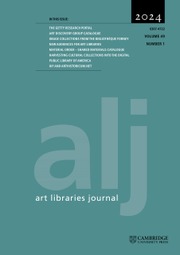Welcome to this special issue of the Art libraries journal dedicated to zines, zine collections and libraries in the UK. The selection of articles highlights the intense activity currently taking place around this area and documents a range of significant developments, although it does not attempt to be a comprehensive survey of this diverse and rapidly evolving field.
Our contributors discuss institutional (national, academic and specialist) libraries and independent/community ones, long established zine collections (British Library, London College of Communication Library) and others much more recent. Several of them are not based in art libraries, but zines, and zine collection development and management, are topics highly relevant to art librarianship, and I hope of interest to many art librarians.
Zines relate to numerous key concerns of the profession, not just as artefacts or because of their visual qualities, but also in their DIY nature, the close relation between content and form, the politics of production and distribution, etc. The acquisition and cataloguing challenges -practical and intellectual- they present will be familiar to those used to working with artists’ books, catalogues and art ephemera. Ethical considerations are essential to most aspects of their management, sometimes associated with critical or radical approaches to librarianship. They break down the separation between special collections and main collection, and the possibilities they offer for use in outreach or information literacy are enormous.
Editing this issue has been a very enjoyable journey that would not have been possible without the generosity of the contributors, and my gratitude goes to all of them for such insightful, personal and knowledgeable approaches to their subject. I am also grateful to the zine librarian community at large for the advice, encouragement and support received from the start, and I look forward to further contributions by its members to the ALJ in the future.


